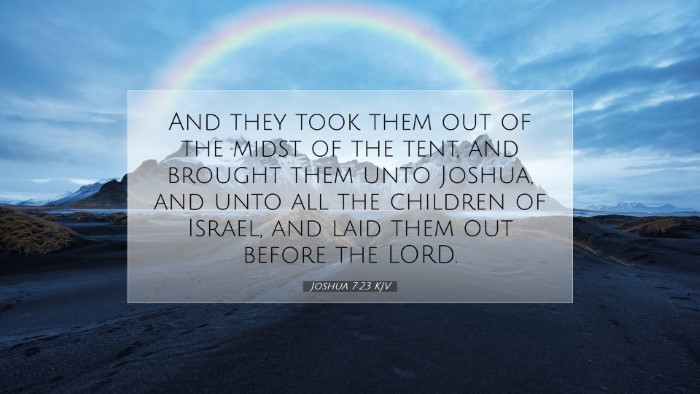Commentary on Joshua 7:23
Verse (NKJV): "And they took them from the midst of the tent, brought them to Joshua and to all the children of Israel, and laid them out before the LORD."
Introduction
Joshua 7:23 falls within a dramatic narrative that showcases the severity of sin and the seriousness of obedience to God. The chapter deals with the repercussions of Achan’s sin in the Israelites’ camp after the conquest of Jericho. This verse encapsulates a moment of confrontation and accountability before the Lord, offering profound lessons to the readers.
Contextual Analysis
The context of Joshua 7 depicts Israel's downfall in the face of a minor city, Ai, due to unconfessed sin within the camp. Achan's sin of taking the accursed things was not merely an individual act but had corporate implications for Israel. This verse is integral as it illustrates the acts of bringing the stolen items before Joshua and the people, fulfilling the divine requirement of exposure and witness.
Commentary Insights
-
Matthew Henry:
Henry notes that the exposure of Achan’s sin was crucial to restoring God’s favor upon Israel. The act of bringing the accursed items represents a public declaration of guilt and a step towards repentance. The seriousness of Achan's act and the collective responsibility of Israel are themes that resonate throughout his commentary.
-
Albert Barnes:
Barnes emphasizes the tangible aspect of sin. He points out that the act of laying out the stolen items before the LORD underscores the principle that hidden sins must be brought into the light. This public demonstration serves as a stark reminder to the entire community of the consequences of transgression against God’s commands.
-
Adam Clarke:
Clarke focuses on the procedural aspect of God's guidance. He highlights the importance of obedience in the chain of events leading to victory or defeat. In his view, the laying out of the stolen items signifies an important spiritual lesson: that confession and accountability are necessary for restoration and holiness within the community.
Theological Implications
The verse raises several pertinent theological themes that merit further exploration:
-
Sin’s Corporate Nature:
The sin of Achan affected the entire community, illustrating the biblical principle that individual actions can have broader ramifications. As Paul articulates in 1 Corinthians 5:6, a little leaven leavens the whole lump, reminding present-day believers of their interconnectedness within the body of Christ.
-
The Necessity of Accountability:
This passage emphasizes the need for transparency and accountability in the faith community. Pastors and church leaders are called to protect the integrity of the church, which often requires uncomfortable confrontations regarding sin.
-
Confession and Restoration:
The act of retrieving the accursed items is a step towards restoration. In the Christian tradition, confession leads to healing (James 5:16), and thus this narrative lays groundwork for understanding how sin must be dealt with for spiritual renewal and collective restoration.
Lessons for Pastors and Church Leaders
From this verse, several lessons emerge that can guide pastors and leaders:
-
Encourage Transparency:
Leaders should foster an environment where confession and accountability are norms. This not only strengthens the community but also aligns with the biblical call to holiness.
-
Address Sin Swiftly:
When sin is identified, it is imperative to address it promptly. The Israelites were swift in bringing forth the evidence of transgression, a principle that should be emulated in leadership today.
-
Teach the Weight of Collective Responsibility:
Leaders must teach that every member's actions affect the whole body. This understanding fosters careful living and conscious discipleship.
Conclusion
Joshua 7:23 encapsulates a powerful moment of accountability within a community of believers. The act of bringing forth the stolen items illustrates not only the nature of sin but also the requirement for restoration. The insights from Matthew Henry, Albert Barnes, and Adam Clarke provide a rich theological framework, urging modern readers to reflect on their responsibility within the body of Christ and to pursue holiness in light of the corporate implications of sin.


